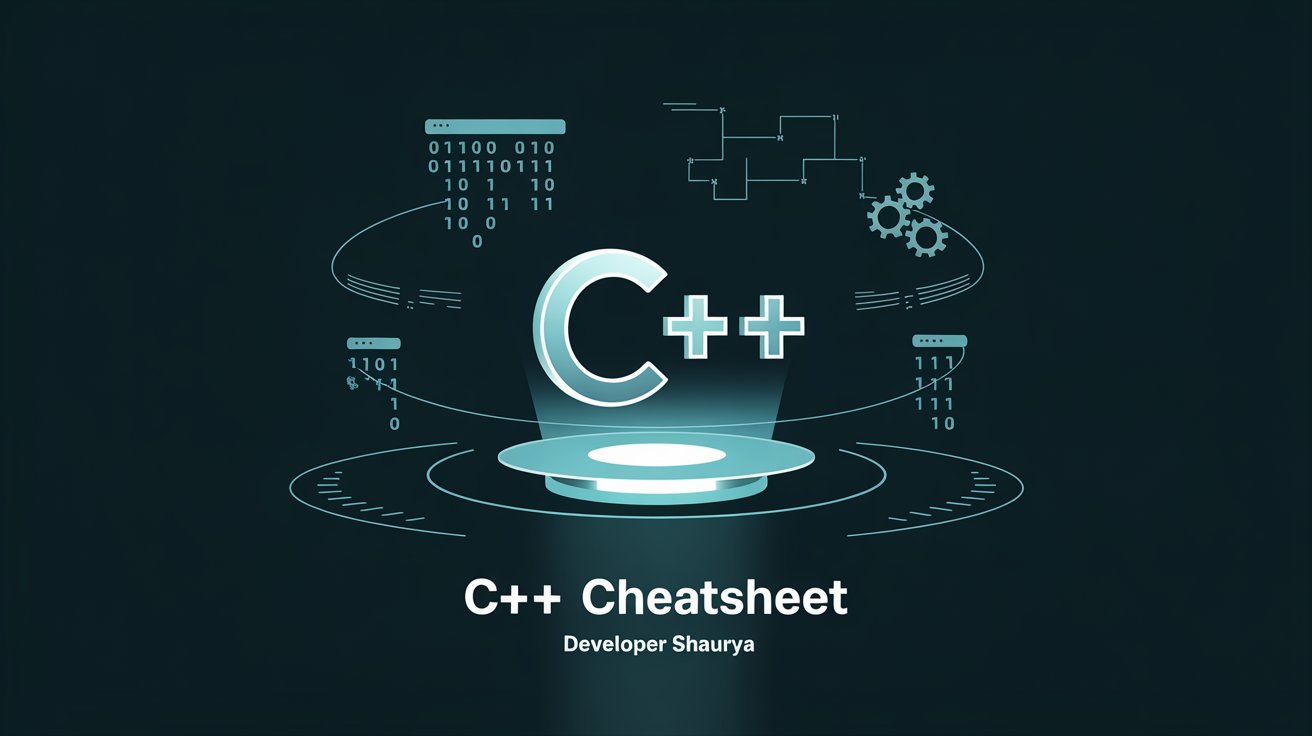Content Table
- 1. Basic Program Structure
- 2. Data Types
- 3. Input & Output
- 4. Operators
- 5. Control Flow
- 6. Functions
- 7. Arrays & Strings
- 8. Pointers
- 9. References
- 10. Dynamic Memory
- 11. Structures
- 12. Classes & OOP
- 13. Constructor & Destructor
- 14. Inheritance
- 15. Polymorphism
- 16. Encapsulation
- 17. Abstraction
- 18. Templates
- 19. Exception Handling
- 20. File Handling
- 21. STL (Standard Template Library)
- 22. Smart Pointers (C++11)
- 23. Lambda Functions
- 24. Namespaces
- 25. Preprocessor
- 26. C++11/14/17 Features
1. Basic Program Structure
#include <iostream>
using namespace std;
int main() {
cout << "Hello, World!\n";
return 0;
}
2. Data Types
int→ 4 bytesfloat→ 4 bytes (6 decimal places)double→ 8 bytes (15 decimal places)char→ 1 bytebool→ true/falsestring→ textlong,long long→ larger intsunsigned→ no negative numbers
int x = 10;
double pi = 3.14159;
char c = 'A';
bool flag = true;
string s = "Hello";
3. Input & Output
int n;
cin >> n;
cout << "Number: " << n << endl;
4. Operators
- Arithmetic:
+ - * / % - Assignment:
= += -= *= /= - Relational:
== != < > <= >= - Logical:
&& || ! - Bitwise:
& | ^ ~ << >>
5. Control Flow
if (x > 0) cout << "Positive";
else if (x < 0) cout << "Negative";
else cout << "Zero";
switch (grade) {
case 'A': cout << "Excellent"; break;
default: cout << "Invalid";
}
for (int i=0; i<5; i++) cout << i << " ";
while (n>0) { cout<<n; n--; }
do { cout<<n; } while(n>0);
6. Functions
int add(int a, int b) { return a+b; }
void greet() { cout << "Hello"; }
inline int square(int x) { return x*x; }
7. Arrays & Strings
int arr[5] = {1,2,3,4,5};
for(int i=0;i<5;i++) cout<<arr[i];
string s = "World";
cout << s.size();
s.append("!");
8. Pointers
int x=10;
int *p=&x;
cout << *p; // value
cout << p; // address
9. References
int a=5;
int &ref=a;
ref=10; // changes a
10. Dynamic Memory
int *ptr = new int(5);
cout << *ptr;
delete ptr;
11. Structures
struct Student {
string name;
int age;
};
Student s1={"Ravi",21};
12. Classes & OOP
class Car {
public:
string brand;
Car(string b) { brand=b; }
void drive() { cout<<brand<<" driving\n"; }
};
Car c("BMW");
c.drive();
Access Modifiers
public→ accessible everywhereprivate→ accessible inside class onlyprotected→ accessible in derived classes
13. Constructor & Destructor
class A {
public:
A() { cout<<"Constructor\n"; }
~A() { cout<<"Destructor\n"; }
};
14. Inheritance
class Parent {
public: void speak(){cout<<"Hello";} };
class Child: public Parent {
public: void run(){cout<<"Running";} };
Child c; c.speak(); c.run();
15. Polymorphism
class Base { public: virtual void show(){ cout<<"Base"; } };
class Derived: public Base { public: void show(){ cout<<"Derived"; } };
Base* b = new Derived();
b->show(); // Derived
16. Encapsulation
- Data hidden in private
- Access via getters/setters
17. Abstraction
class Shape {
public: virtual void draw()=0; // pure virtual
};
class Circle: public Shape {
public: void draw(){ cout<<"Circle"; }
};
18. Templates
template<typename T>
T add(T a, T b) { return a+b; }
cout<<add(3,4);
cout<<add(3.5,4.5);
19. Exception Handling
try {
throw 10;
} catch (int e) {
cout << "Error: " << e;
}
20. File Handling
ofstream out("data.txt");
out << "Hello File";
out.close();
ifstream in("data.txt");
string line;
while(getline(in,line)) cout<<line;
in.close();
21. STL (Standard Template Library)
Vectors
vector<int> v={1,2,3};
v.push_back(4);
for(int x:v) cout<<x<<" ";
Maps
map<string,int> m;
m["Alice"]=20;
cout<<m["Alice"];
Sets
set<int> s={1,2,3};
s.insert(2);
for(int x:s) cout<<x;
Algorithms
sort(v.begin(), v.end());
reverse(v.begin(), v.end());
22. Smart Pointers (C++11)
#include <memory>
unique_ptr<int> p1(new int(10));
shared_ptr<int> p2 = make_shared<int>(20);
23. Lambda Functions
auto add = [](int a,int b){ return a+b; };
cout<<add(3,4);
24. Namespaces
namespace first { int x=10; }
cout<<first::x;
25. Preprocessor
#define PI 3.14
#ifndef PI
#define PI 3.14159
#endif
26. C++11/14/17 Features
autotype deduction- Range-based loops
nullptrconstexprmove semantics- Structured bindings
std::optional,std::variant
All CheatSheets view
Checkout other Cheatsheets
Checkout My YouTube Channel
Read my other Blogs
- Top 5 Mistakes Beginners Make While Learning to Code (And How to Avoid Them)
- Best Programming Languages to Learn in 2025 (and Why)
- Before You Learn Web Development: The Advice No One Gave Me
- How to Start Coding in 2025: Beginner’s Roadmap
- Why Coding is Important: The Language of the Future
- Are Coding and Programming the Same? – The Complete Truth You Need to Know
- Will Coding Be Replaced by AI?
- C++ Programming: Everything You Need to Know
